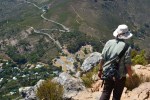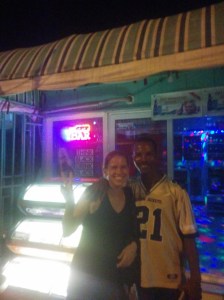Edit: Update to include another link in the water vs paper debate in #3.
For better and worse, here are some of the things that surprised me during our five-month trip through Asia and Africa.
1. The world is a really big place, like a *really* big place. I know this sounds naive, but one of the most surprising things about our trip was that even though we took more than five months off work to travel, we could see only a fraction of the world. Even once we narrowed our itinerary to “just” Asia and Africa, we still had to be brutally choosy about the 13 countries and the cities that we got to see. Just off the top of my head, if we had had the time, we would have wanted to see more of rural China, perhaps taking a train from Beijing to Shanghai, we would have spent even more time in Vietnam, perhaps exploring the rice paddies up north and definitely getting to Phu Quoc, and we would have spent more time in Egypt, including spending time diving diving up north. And if you start adding additional continents into the mix, we would really like to have made our way to Eastern Europe, including Croatia. And, did I mention that I studied abroad in Italy? I could have taken Dan around Italy for a month with one hand tied behind my back — it would have been much easier than all the traveling we did where every country was somewhere neither of us had been before and we often didn’t know more than a few words of the local language or any of the customs around transportation.
2. Honduras is poor, even relative other less developed countries. Living and working in Honduras in 2006, I understood that the country was poor, but it was not until this trip that I gained an understanding for exactly how poor it is relative to most of the rest of the world. Throughout our travels, we saw the occasional barefoot kid with a bloated belly (early sign of malnutrition), the occasional thatch-roofed home (thatched homes are often leaky and riddled with bugs, which is why, given the opportunity, people rush to get a tin roof) and the occasional girl carrying a jerrycan of water down the highway (transporting water by hand/on one’s head takes a lot of time and energy and can be dangerous). (FWIW, along our route, these sites were most common in Cambodia, Uganda, Kenya, and Ghana.) But despite traveling overland through fairly rural areas, we rarely saw these sites at the frequency that we saw them in Honduras when I lived there. And we saw a lot more agriculture (Uganda, in particular, is famous for its soil quality) and livestock (water buffaloes in Cambodia, and cows, chickens, and goats throughout Africa) than I remember seeing in Honduras. I realize that our anecdotal experience is limited, but UN data seems to lend some weight to our observations. Honduras is #129 on the Human Development Index, and Cambodia, Ghana, Kenya, Tanzania and Uganda all fall within the next 35 ranked countries out of the 187 countries with complete data. Their Human Development Index scores are all with .15 of one another and their Inequality-adjusted Human Development Index scores are even closer, within a range of .1. All of the other countries we visited on our trip, including Vietnam and South Africa, felt substantially more developed than Honduras, and the data support that observation too. It seems important to keep these facts in mind when politicians talk of sending unaccompanied minor immigrants from Honduras back to the country they fled.
3. I was less welcoming of some cultural differences than I thought I would be.
- Take, for example, sitting on the floor to eat. We had the most experience with this during our week-long volunteer stay in Vietnam. Sure, part of the reason I didn’t like it was that I am not flexible in the ways that are required to hold your bowl of rice and chopsticks in one hand and reach out across the bamboo mat to grab the spinach with your other hand. But also, I think there may be some legitimate health reasons to avoid eating on the floor. We were never able to get the bamboo mat that we ate on particularly clean, and hair and dirt often made their way onto the mat. Even though, in general, people took their outdoor shoes off at the door, at least one person in a hurry to catch a bus walked across the mat in his shoes. But even eliminating all of the outdoor waste couldn’t guarantee cleanliness because of the bathrooms. The bathrooms in many countries are wet constantly for one of two reasons. One reason is that the toilets are often co-located with the showers in homes. (More on the second reason in a minute.) So the bathroom floor is soaked, and someone gets a stomach bug and uses the bathroom, and then someone else walks into the bathroom in their house shoes, and then puts those same house shoes on the mat, perhaps stepping over some food. I am not saying that there is tons of cross-contamination, just more potential for it with your feet so close to your food than when you are eating at a table. And I will say that the stomach bug passed around our volunteer house in a hurry. And whether it was for the potential health benefits or the comfort of the Western volunteers, the volunteer house got a table when it got the chance.
- Using water instead of toilet paper in restrooms is the second reason why restrooms in many countries, even public restrooms, are wet constantly. We had the most experience with this in Malaysia, but found it in some other places with large Muslim populations and good plumbing. Thanks, internet, for all of the lively discussions of this cultural difference. The best posts I read on this topic include “Butt wipes. Water sprays. Bidets. Lotas. And other toilet stuff,” by Ethar El-Katatney and one by Svan Nathan on Quora, where he writes the following in favor of using water:
- “Water is more hygienic, since all the urine and poop gets washed off, leaving a clean bottom.
- With water, there is less friction against the skin. No matter how soft the toilet paper is, you still have to scrub it against your skin. Water is a boon for people who are sensitive to toilet paper.
- You don’t need to spend a fortune on buying toilet paper every month.
- Too much toilet paper in the bowl can clog it, but water will not.
- Toilets that use water often have wet floors. And so, they also have a drain on the floor, so that the entire toilet and floor can be washed clean regularly.
- The hems of pants and skirts are liable to get wet in a wet bathroom, and it takes a lot of careful planning and contortions to ensure that the clothes stay dry.“ [And he continues…]
But this is where I get hung up. And maybe it was only because we were traveling and so often both in a rush and carrying a lot of bags into bathrooms, but there was water, with some amount of fecal matter in it, I can only assume, splattered ALL over some of the public restrooms. I don’t exactly understand why so much of the bathrooms are wet — the entire toilet and the floor around it, but as Svan noted, they really do get wet. Perhaps this is more of a problem for women too, who are often using the toilets for what would be a less intensive activity except that as soon as you approach one, you have fecal-matter water covering your shoes and threatening anything else you are wearing or carrying. I hear Svan’s other arguments, but my damp sandals and the damp pants that I would be wearing for the next 11 hours on a bus wouldn’t let me get behind this cultural difference.

4. For his part, Dan was surprised by how well, relative to some countries, our government works. While it’s fair, and even patriotic, to demand a better government — one that protects and supports more of its immigrants and one that rummages through less data on innocent civilians — after just a few days without power and running water, all the while negotiating police contributions, you realize that for all it gets wrong, our country gets a lot right.
5. The world is not, seemingly, marching towards a more “western” future. In my own naive, American, way, I had this default notion that the world was generally becoming more “western,” more open, more capitalist. Like, if we just sat back and waited, the world will move naturally towards a more open future. And while some places are experiencing a dramatic growth in capitalism — the economy in Vietnam is an incredible thing to witness right now and you can literally feel the middle class buzzing underneath you — some places are not. While traveling in Malaysia, we had a sense that the country was once more open than it was on it’s way to becoming. We were there during Deepavali, and as a Hindu holiday, it was still celebrated and recognized as an official holiday, but we heard more than once about the growing power of the morality police — a special police force enforcing special laws on the Malay-Malay Muslims in the country (who are not allowed to exit the Muslim religion). The government there is a big supporter of technology companies, but we heard that if foreign tech companies visited, and hosted events that included alcohol, (something perhaps expected with Western companies entering a multi-ethnic and multi-religious country) then anyone who is paid by the government (and the government supports most of the tech companies and employees in the country) would be prohibited from attending the event, even if she helped to plan and coordinate it.
6. Our college-educated (and generally amazing) safari guide expects his future wife to go to a week of “wife school” before marriage. I feel like perhaps I haven’t said enough about how amazing our guide was — we had a friend who had been on seven similar group trips over several years, and she said that this guy was the best guide she had ever had. So yeah, he was amazing. But this week of wife school is not, in fact, all a hen party (though our guide couldn’t rule out the possibility that there might be one night of hen partying); it is really a week-long course in how to be a wife. We later learned that the wife school is a kind of substitution for the events that used to take place around female circumcision. Because female circumcision is no longer practiced in our guide’s tribe, wife school is a way of maintaining some of those traditional teachings. +1 for wife school.
7. There really might be either a parade of elephants or a cackle of hyenas between you and the bathrooms when you are camping in the Serengeti. There are no fences around either the Serengeti game park or the campsites inside it, and also, there are no lodges. So, everyone camps, even folks on the fancy tours camp. This means that our camping was taken up a notch from the usual set up. Someone set up our tents for us, provided us toilet paper, and cooked our dinner (this may have also been related to the fact that the kitchen was located inside a cage). So, we arrived right at sunset and had no work to do. Naturally, I started drinking the whisky we had brought. And then, at dinner, our guide announced that a beer truck had come by the campsite. In a lot of parts of Africa, the economy just didn’t work in the way I expected. For example, we couldn’t find any woman (or man) willing to do our laundry in Zanzibar — even if we were willing to pay generously, and they were currently doing their family’s own laundry. And in South Africa, we not once, but twice, arrived at a winery, that was open, but that wouldn’t let us buy any wine. So I was completely impressed with this Serengeti beer truck and more than a little eager to support this young entrepreneur by purchasing two five-dollar bottles of Serengeti beer. It was after the whisky and half-way through our beer that our guide started going over the necessary safety precautions one must follow if you need to use the restroom in the middle of the night at the campsite. Wake up your tent buddy and make him go with you, bring your headlamps and flashlights and shine them in front of you, talk the whole way. If you see something with two eyes close together moving toward you, shine your light at it, and back away slowly. Dan immediately started dehydrating himself. I finished my beer and drank some water, and woke up at 2AM with a desperate need to pee. I woke up Dan. We walked towards the bathrooms (which are also located inside a cage), and that is when we saw the group of hyenas, and at least two of them began slinking towards us. We retreated, waited in our tents for about 45 minutes (which felt like 5 hours on a full bladder) and then again made our way to the restrooms, satisfied that the hyenas had backed off a bit. So yeah, when you are camping in the Serengeti, I still recommend supporting that beer-truck kid, but perhaps skipping the whisky.
8. Traveling the world is incredibly doable. I was shocked at how doable the whole thing felt. Yes, it takes savings and planning and taking some care (sign up for STEP), but if you are considering it, then do it. I am not a low-maintenance person. I brought three different types of hair products. I brought two travel pillows so that I could always sleep with three pillows — like this. I have sensitive skin. I’m freaking allergic to aloe. It goes without saying that I’m allergic to a lot of laundry detergents, and so, whenever we were able to pay someone to do our laundry, I would have to re-rinse and re-dry my underwear. I am not a champion sleeper, but I slept like a baby in those safari tents (once I learned to stack up two of the safari mattresses). I’m telling you, if I can do this, almost anyone can. You won’t remember the ants in your hotel room or the biting flies on the safari…well, I mean, you will, but those memories won’t compete with the noodle bowls, the great wall, or the site of a leopard dragging its kill up a tree. Find some good travel-sized hair products and a very patient travel partner, and go.






















































